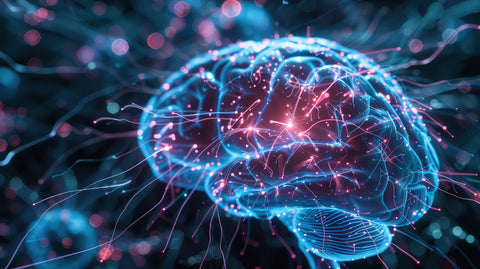Disclaimer: The information provided in this blog is for educational and informational purposes only and is not intended as a substitute for professional medical advice, diagnosis, or treatment. Always consult with a qualified healthcare provider before making any changes to your diet, exercise routine, or health regimen. The opinions expressed here are based on personal research and experience and should not replace guidance from a licensed nutritionist, dietitian, or medical professional. Use any information provided at your own risk.
The brain is a complex network of signals, chemicals, and connections that influence everything from mood and motivation to focus and resilience. Among these chemical messengers are neuromodulators, which help regulate and fine-tune brain activity, impacting mental health in powerful ways.
Understanding what neuromodulators are, how they function, and how they influence mental well-being can provide insight into optimizing brain health for greater emotional balance, focus, and overall vitality.
What Are Neuromodulators?
Neuromodulators are a type of neurotransmitter, but instead of directly transmitting signals between neurons, they work more broadly, adjusting and regulating brain activity over time.
Unlike traditional neurotransmitters that act quickly and locally, neuromodulators influence larger brain regions, helping to stabilize mood, regulate motivation, and shape long-term mental health.
The four most well-known neuromodulators are:
- Dopamine – The reward and motivation regulator
- Serotonin – The mood stabilizer
- Norepinephrine – The alertness and stress responder
- Acetylcholine – The focus and learning enhancer
Each plays a critical role in cognition, emotional resilience, and psychological health.
The Key Neuromodulators and Their Impact on Mental Health
1. Dopamine: The Motivation & Reward Modulator
What It Does:
- Drives motivation and goal-setting
- Enhances pleasure and reward-seeking behavior
- Supports learning, memory, and focus
Imbalances Can Lead To:
- Too much dopamine – Linked to addiction, impulsivity, and manic episodes
- Too little dopamine – Causes lack of motivation, fatigue, and symptoms of depression
Ways to Support Healthy Dopamine Levels:
- Set and achieve small, meaningful goals
- Engage in exercise and movement
- Reduce overstimulation from social media and processed foods
2. Serotonin: The Mood and Emotional Balance Modulator
What It Does:
- Helps regulate mood and emotional stability
- Supports stress management and relaxation
- Plays a role in sleep, digestion, and overall well-being
Imbalances Can Lead To:
- Low serotonin – Contributes to depression, anxiety, and mood disorders
- Excess serotonin – Can cause serotonin syndrome, leading to agitation and confusion
Ways to Support Healthy Serotonin Levels:
- Get natural sunlight to boost production
- Engage in mindfulness and gratitude practices
- Eat serotonin-supporting foods like nuts, eggs, salmon, and leafy greens
3. Norepinephrine: The Stress & Alertness Modulator
What It Does:
- Triggers the fight-or-flight response
- Increases focus and cognitive alertness
- Helps regulate blood pressure and heart rate
Imbalances Can Lead To:
- Excess norepinephrine – Causes heightened anxiety, restlessness, and panic attacks
- Low norepinephrine – Contributes to brain fog, low energy, and difficulty concentrating
Ways to Support Healthy Norepinephrine Levels:
- Engage in cold exposure therapy (cold showers, ice baths)
- Use breathwork techniques to regulate stress
- Perform high-intensity workouts to naturally stimulate norepinephrine
4. Acetylcholine: The Focus & Learning Modulator
What It Does:
- Enhances memory, learning, and problem-solving
- Supports concentration and cognitive function
- Plays a role in neuroplasticity (brain adaptability)
Imbalances Can Lead To:
- Low acetylcholine – Associated with brain fog, memory decline, and difficulty learning
- High acetylcholine – Can cause muscle twitching, excessive stimulation, and anxiety
Ways to Support Healthy Acetylcholine Levels:
- Eat foods rich in choline (eggs, fish, nuts)
- Engage in cognitive challenges like puzzles and reading
- Prioritize deep, restorative sleep for brain recovery
Balancing Neuromodulators for Mental Vitality
A well-functioning brain doesn’t rely on just one neuromodulator—it requires balance among all of them. Optimizing brain chemistry can lead to:
✔ Improved mental clarity and focus
✔ Increased motivation and resilience
✔ Greater emotional balance and stress management
Ways to Naturally Support Neuromodulator Health:
- Get consistent, high-quality sleep (affects all neuromodulators)
- Exercise regularly (boosts dopamine, serotonin, and norepinephrine)
- Eat a nutrient-rich diet (supports neurotransmitter production)
- Practice mindfulness & stress reduction techniques (regulates cortisol and mood)
- Engage in lifelong learning (strengthens acetylcholine pathways)
This Week’s Challenge: Optimize One Neuromodulator
For the next seven days, focus on one specific neuromodulator and try incorporating a new habit to support it.
For example:
- If you feel unmotivated, work on boosting dopamine through small goal-setting.
- If you feel stressed and anxious, focus on serotonin-supporting practices like mindfulness or sun exposure.
- If you struggle with brain fog, add choline-rich foods and cognitive exercises for acetylcholine support.
Understanding how neuromodulators shape your mental health empowers you to take control of your well-being. Small, intentional changes lead to big improvements in brain function, focus, and emotional balance.




